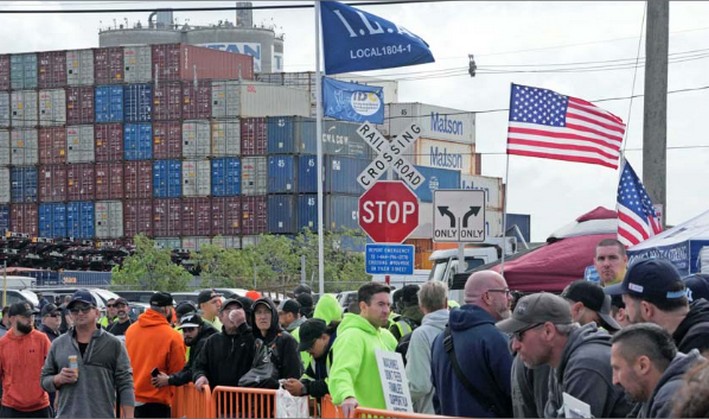- So far, around 600 containers of fresh fruit have been reported as impacted, some of which were left in Panama due to the inability to continue to their destination.
Chilean exports of fruits, wines, forestry products, and salmon are currently emerging as the sectors most concerned or anticipating adverse effects from the port strike that began yesterday in the United States.
Approximately 85,000 dockworkers at 14 major ports on the U.S. East Coast and the Gulf of Mexico began a total shutdown yesterday due to the lack of agreement between the International Longshoremen's Association (ILA) union and the employer group US Maritime Alliance (USMX).
This is the first strike on the U.S. East Coast since 1977, affecting over 43% of the country's maritime trade and potentially costing more than $2 billion per day in trade of food, vehicles, or hydrocarbons. Oxford Economics estimated it could cost the U.S. economy between $4.5 billion and $7.5 billion per week, AFP reported.
Yesterday, ports in New York-Newark, Baltimore, Savannah, Houston, Miami, and New Orleans were halted, with picket lines and gatherings at their entrances.
Chilean producers anticipate negative impacts on shipments to the U.S., likely linked to delays in reaching their destination, according to logistics and shipping sectors.
Export alarms
"Currently, our records indicate that more than 580 containers of Chilean fresh fruit are being affected, some of which were left in Panama due to the inability to continue to their destination or will not be able to unload upon reaching the East Coast, leaving the ship idle with associated costs and missed delivery schedules to U.S. distributors," said Miguel Canala-Echeverría, general manager of Frutas de Chile.
He added that these containers correspond to 11,743 tons of Chilean fresh fruit (11,362 tons of citrus, 177 tons of kiwis, and 204 tons of avocados), with an estimated FOB value of $37 million.
Antonio Walker, president of the National Agriculture Society (SNA), stated, "We are monitoring the U.S. port shutdown because it is a concerning issue." He added, "If it extends for a couple of weeks, it could affect the 120 million boxes of cherries we need to export, resulting from a historically good harvest."
Francisco Gana, head of the SNA's Studies Department, said, "We know efforts are being made to reroute agro-export shipments to the port of Gloucester." He added, "Regarding wine exports, the strike could cause delays in shipments; however, since it is not a perishable product, complications should be minor."
The forestry company Arauco stated, "This logistical disruption could potentially be very serious, especially considering the holiday season and large cargo flows heading to the North American market. Arauco ships 600 containers weekly with lumber and panels bound for the East Coast."
Arturo Clément, president of SalmonChile, said, "The U.S. is crucial for our sector's exports, so we hope this conflict can be resolved to avoid potential effects for both Chilean exporters and the international economy."
Mediterranean Shipping Company (MSC Chile) indicated that 14% of Chilean exports and 7.5% of container imports are related to U.S. East Coast and Gulf ports. "In other words, about 10% of Chile's total export-import market volume would be affected," they said.
MSC added that the most affected products would be from the forestry sector, fresh fruit, other agro-industrial goods, and wine. The shipping company noted that for each day of shutdown, there would be approximately a week of subsequent congestion.
Similarly, Tomas Schulze, business development executive at KLog.co, added, "If the strike lasts a week, the system would normalize by mid-to-late November; if it lasts two weeks, we're talking about 2025. Therefore, it is extremely important for them to reach an agreement as soon as possible, as this will directly impact all international trade."
Regarding the most affected Chilean shipments to the U.S., Schulze mentioned "agricultural products, seeds, fruits, certain types of avocados, finished food products, and food raw materials. On the other hand, refined copper exports, fish, and grapes are also impacted."
Source: Subscription edition ofEl Mercurio







Comments (0)
No comments yet. Be the first to comment!
Leave a comment